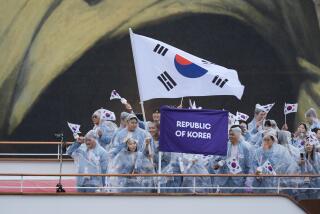World Cup â94 : WORLD CUP USA â94 / GROUP C PREVIEW : A Greater Goal : Gaining Host Role in 2002 Is on South Koreaâs Wish List
Last October, Japan and South Korea met in a World Cup qualifier in Doha, Qatar, that had as much to do with century-old hatreds as it did with soccer.
For the Koreans, the old wounds of Japanese occupation and subjugation resurfaced after their 1-0 defeat. Seoul newspapers called it, âThe Second Great Insult,â a biting reference to the day in 1910 that Japanâs army took down the flag and Koreans became subjects of Japanâs emperor.
The day is known as the âGreat Insult,â and 50 years of colonization did nothing to erode the bitter feelings, which spilled over into the stadium in Qatar.
In soccer terms, the loss was equally devastating. South Koreaâs chances of earning a Cup berth diminished considerably after the defeat. Japan simply needed a victory over Iraq to earn its first berth; South Korea needed a couple of miracles.
Yet, after the qualifying roundâs final games a few days later, South Korea, not Japan, was celebrating.
In the span of about 30 seconds in separate stadiums, South Korea rode an emotional roller-coaster to qualify for its fourth World Cup finals.
First, South Korea defeated North Korea, 3-0, while elsewhere in the city Japan was leading Iraq, 2-1. But in the closing moments, Iraq tied the score on a header from Jaffar Omram Salman to ruin Japanâs quest.
âWe thought it was over for us, then all of a sudden it wasnât,â Gu Sang-bum, South Korean captain, told reporters.
It might take more miracles for the Koreans to advance past the first round. South Korea plays Spain in its opener June 17 at the Cotton Bowl in Dallas. It also faces defending champion Germany and Bolivia in Group C.
In 1990 in Italy, the Koreans lost all three of their games--2-0 to Belgium, 3-1 to Spain and 1-0 to Uruguay. But in 1986 in Mexico, South Korea earned international respect when it tied Bulgaria, 1-1, lost to eventual champion Argentina, 3-1, and lost to defending champion Italy, 3-2.
In its only other Cup appearance, South Korea failed miserably, losing to Hungary, 9-0, and Turkey, 7-0, in 1954.
âWe have to admit that we are slightly behind the other teams,â said Kim Ho, the Korean coach who began his career on the high school level in 1976. âWe are competing to reach the final 16. Our best chance is to beat Bolivia. But we are not afraid of any team. If we use our skills well, then we can expect some surprises.â
South Korea is led by Kim Joo-sung, a veteran of the last two Cups and who was Asiaâs player of the year in 1989. Kim gained invaluable seasoning this year with VfL Bochum in the German Bundesliga.
The Koreans rely on speed to offset the finely honed technical skill of the Europeans and South Americans. But South Korea is weak in the goal and team members lack endurance.
Kim has tried to correct the latter in training. Twice a week the players run from sea level to the summit of the countryâs highest peak, 6,400-foot Mt. Hallasan, and back.
Soccer was not popular in the country until after the 1910 occupation. It then remained the most popular sport until about 10 years ago when baseball captured the nationâs interest.
Some think its current resurgence could be linked to South Koreaâs record this summer. If it advances to the second round, some officials say South Korea would enhance its chances to play host to the 2002 Cup.
Its competition is Japan, the favorite to win the role of host.
The Asian rivals want to play host to the regionâs first World Cup for the obvious economic benefits. But South Korea has offered to sponsor it jointly with communist North Korea, and has used it as a political ploy.
âIf we are awarded the chance, it will no doubt contribute greatly to reunifying South and North Korea,â said Chung Moon-jong, federation president.
So who knows, perhaps another unexpected occurrence will change the course of history for Korean soccer.
It happened in Qatar.
It could happen again.







